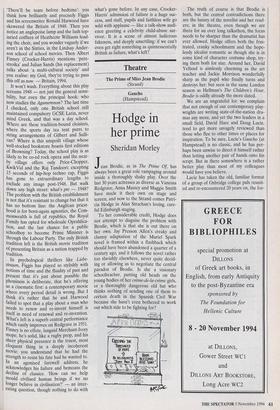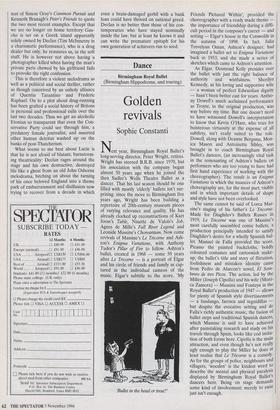Theatre
The Prime of Miss Jean Brodie (Strand) Gaucho (Hampstead)
Hodge in her prime
Sheridan Morley
Jean Brodie, as in The Prime Of, has always been a great role rampaging around inside a thoroughly shaky play. Over the last 30 years actresses as diverse as Vanessa Redgrave, Anna Massey and Maggie Smith have made it their own on stage and screen, and now to the Strand comes Patri- cia Hodge in Alan Strachan's loving, care- ful Edinburgh staging.
To her considerable credit, Hodge does not attempt to disguise the problem with Brodie, which is that she is out there on her own. Jay Presson Allen's creaky and clumsy adaptation of the Muriel Spark novel is framed within a flashback which should have been abandoned a quarter of a century ago, and it follows the novel rather too slavishly elsewhere, never quite decid- ing or allowing us to negotiate the central paradox of Brodie. Is she a visionary schoolteacher, putting old heads on the young bodies of her creme-de-la-creme girls, or a thoroughly dangerous old bat who thinks nothing of sending one of them to certain death in the Spanish Civil War because she hasn't even bothered to work out which side to be fighting for? The truth of course is that Brodie is both, but the central contradictions there are the luxury of the novelist and her read- ers; in the theatre, even though we are there for an over long talkathon, the focus needs to be sharper than the dramatist has ever allowed. Hodge offers both the frus- trated, cranky schoolmarm and the hope- lessly idealist romantic as though she is in some kind of character costume shop, try- ing them both for size. Around her, David Yelland is aimlessly charming as the art teacher and Jackie Morrison wonderfully sharp as the pupil who finally turns and destroys her: but seen in the same London season as Hellman's The Children's Hour, Brodie is oddly already the more dated.
We are an ungrateful lot: we complain that not enough of our contemporary play- wrights are writing state-of-the-nation dra- mas any more, and yet the two leaders in a small field, David Hare and Doug Lucie, tend to get more savagely reviewed than those who flee to other times or places for inspiration. To be sure, Lucie's Gaucho (at Hampstead) is no classic, and he has per- haps been unwise to direct it himself rather than letting another pair of hands onto his script. But in there somewhere is a rather better play than most of my colleagues would have you believe.
Lucie has taken the old, familiar format of a group of Oxbridge college pals reunit- ed and re-encountered 20 years on, the for- mat of Simon Gray's Common Pursuit and Kenneth Branagh's Peter's Friends to quote the two most recent examples. Except that we are no longer on home territory: Gau- cho is set on a Greek island apparently solely owned by Declan (Tim McInnemy in a charismatic performance), who is a drug dealer but only, he reassures us, in the soft stuff. He is however not above having a photographer killed when having the man's private parts chewed by his girlfriend fails to provoke the right confession.
This is therefore a violent melodrama as well as a political and social thriller, rather as though conceived by an unholy alliance of Quentin Tarantino and Frederic Raphael. On to a plot about drug-running has been grafted a social history of Britons in personal and professional exile over the last two decades. Thus we get an alcoholic Etonian so transparent that even the Con- servative Party could see through him, a predatory female journalist, and assorted other human detritus washed up on the banks of post-Thatcherism.
What seems to me best about Lucie is that he is not afraid of blatant, barnstorm- ing theatricality: Declan rages around the stage and his own destructive, destroyed life like a ghost from an old John Osborne melodrama, bitching on about the turning of his once beloved England into a theme park of embarrassment and disillusion now trying to recover from a decade in which even a brain-damaged gerbil with a bank loan could have thrived on national greed. Declan is no better than those of his con- temporaries who have stayed nominally inside the law, but at least he knows it and can write the premature epitaph for his own generation of achievers run to seed.











































































 Previous page
Previous page